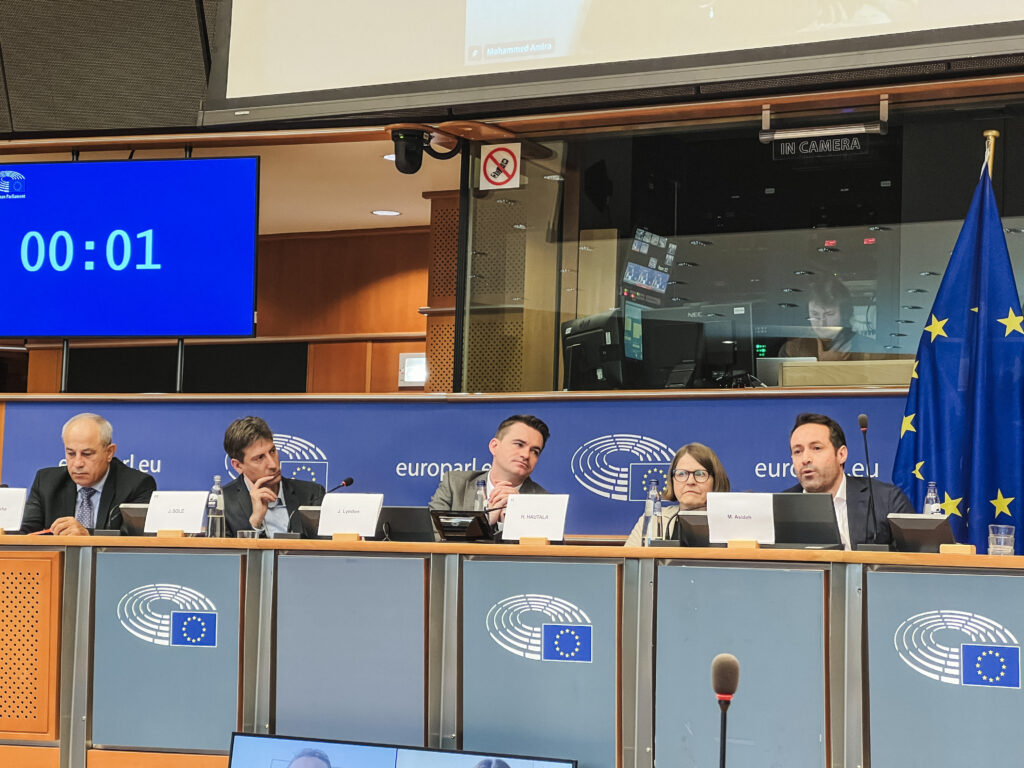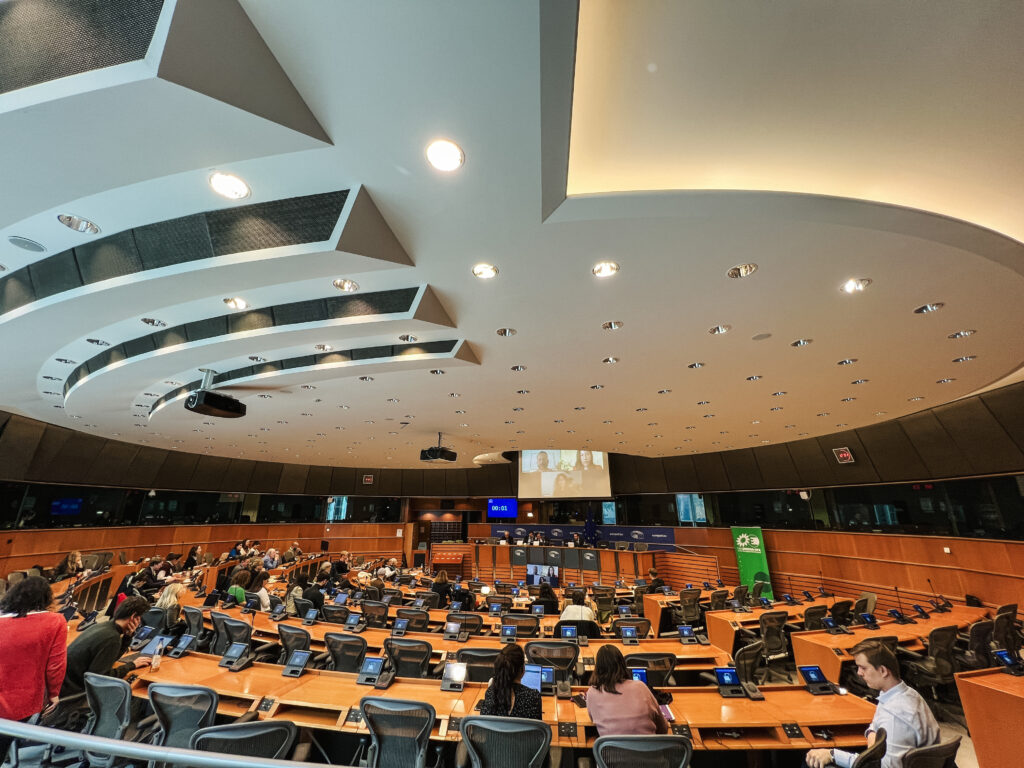Pathways To Peace: ALLMEP at the European Parliament
Last week, ALLMEP co-hosted an event at the European Parliament featuring five leading Israeli and Palestinian voices from our network for a panel discussion on civil society peacebuilding in the face of the current crisis.
Hosted by the Greens/EFA Members of the European Parliament Jordi Solé, Margrete Auken, and Heidi Hautala, the event featured Amira Mohammed (ROPES), Anton Goodman (Rabbis for Human Rights), Hela Lahar (Tech2Peace), Mohammad Asideh (Project Rozana) and Muhammad Darawshe (Givat Haviva).

(left to right: Muhammad Darawshe, MEP Jordi Solé, John Lyndon, MEP Heidi Hautala, Mohammad Asideh)
The event came as the Greens/EFA grouping became the first group in the EU Parliament to urge the prioritization of civil society peacebuilding within the EU’s larger strategy to address the Israeli-Palestinian conflict. As Jordi Solé, Vice President of the Greens/EFA group, told attendees at the Parliament: “we always need to count on civil society, on the peace camp… We need to take into account their expertise, their knowledge about the real possibilities of how we build peace in the region… Because in the end, resolving this conflict, which is a very complex one, requires political will, it requires political commitment, but also it requires civil society, pushing those leaders to this political will and this political commitment”.
The role of the European Union in supporting the work of peacebuilders was developed further by Heidi Hautala, a Vice President of the Parliament, who pointed out that “civil society is there when the governments and the governance structures fail. So perhaps in the next parliament, there could be some sort of a permanent structure for civil society dialogue between Palestinians and Israelis.” Margarete Auken, a Vice-Chair of the delegation for relations with Palestine, similarly emphasized this point, stating “we need the grassroots – and the fantastic work you are doing – but we also need somebody to mobilize here.”

The leaders from within ALLMEP’s network who joined on the day represented a wide range of the theories of change and approaches found within the 160+ group of NGOs that make up the alliance. Yet they were united in their call for greater centrality and support for the work of civil society peacebuilding as part of any strategy to address the unfolding tragedy in the region.
Amira’s work takes a pan-regional approach to the Israeli-Palestinian conflict, leveraging the complex regional dynamics toward peace and equality. But she is also doing incredible thought leadership on the role of Palestinian identity, the fractured way in which it currently works and how it might be reimagined in this moment. Amira highlighted her background as a Palestinian woman from East Jerusalem representing a younger generation, eager to reimagine civil society’s role in shaping events, and committed to its inherent power to do just that: “I do believe that civil society will bring peace, maybe we won’t sign off on it, and take credit for it. But we will bring peace.”
Mohammad (Darwashe) has been a thought leader in the Israel-Palestine peacebuilding space for many years, both in Palestinian-Jewish relations inside Israel, and in cross border work between Israelis and Palestinians, finding connections between these two inherently interlinked spaces. On both sides of the Green Line he pointed to a growing realization that the status quo had collapsed with few still believing: “that we can keep the conflict forever. We’ve had it for 76 years, we can keep it for another 76 years. What you need is not conflict management, you need conflict resolution.”
Anton, an Orthodox Jewish peace activist, works to leverage the role of faith and identity in a profound conversation centered on human rights, something he powerfully urged attendees to cease neglecting in our discussion on Israel-Palestine. “Maybe through this process, we’ll be able as two people to understand that compassion is an endless wellspring. It is not a limited resource. That this is not a binary conflict, a zero sum game. And if you want to make it a binary conflict, well, let’s make it about those who have dreams of a peaceful future. Those who believe in human rights for all. And those who want to see us sunk into a more blood drenched reality”.
Hela leverages technology, entrepreneurship, and creativity, as a mechanism for convening Israelis and Palestinians. Particularly those youngest Israelis and Palestinians who have grown up through this most dystopian phase of the Israeli Palestinian conflict, with almost no engagement or connection with each other. Tech is used as the catalyst to get them into a room, but it’s only the start. It’s then used as a mechanism for addressing the deep issues between Israelis and Palestinians and building intergroup solidarity. Hela emphasized the need for “a real, tangible, ongoing investment in civil society […]. My belief is that political will and commitment will only come when civil society amasses that political will and commitment, and politicians must rise to respond to that need coming from the people because we have been able to demonstrate a new reality that people are so attached to”
Muhammad (Asideh) works to harness health and the inherent interdependence between Israelis and Palestinians, to build shared interests, but also solidarity. And to build a mechanism for Israeli-Palestinian conflict resolution via that universally humanizing issue of health and our vulnerability around it. Muhammad stated: “And when we meet in the same room, as Palestinians and Israelis, we are not equal, to be honest. We’re not equal on any level. Right? But we still meet. Striving for equality one day.”
Closing the event, Vice President Solé told attendees that “I am so glad that the last event I have co-hosted and co-organized in this parliament has been this one. Because it’s been an incredibly interesting conversation that shows that in the end, politics is also about values… I think that this event should be repeated as soon as possible when the new MEPs take up their roles this summer because there will be many more debates on this conflict and the frame has to be this one, has to be the words that we have shared today. So thank you very much for once again showing that conflicts and wars are not inevitable. And this is the role of civil society, this is the role of politics to show that there’s nothing inevitable in conflicts and wars.”
